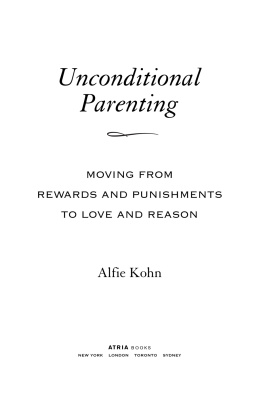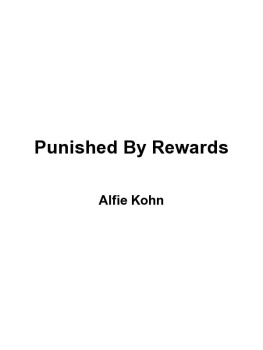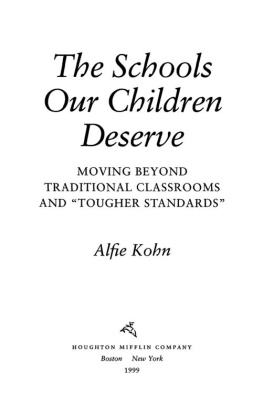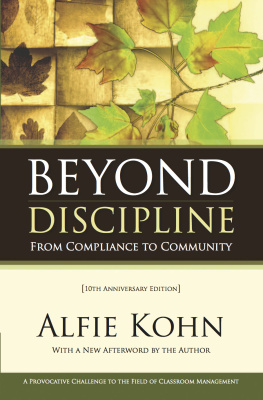Praise for Alfie Kohn and
Unconditional Parenting
Unconditional Parenting is going to make you thinkhardabout the type of relationship you want to have with your child, about your parenting priorities, and about how to avoid many of the mistakes of our predecessors. Its what weve come to expect from Alfie Kohn, and this is unquestionably one of his most persuasive, important works. For your sake and your childs... read it!
Ross W. Greene, author of The Explosive Child
Witty and thought-provoking.... This lively book will surely rile parents who want to be boss. Those seeking alternative methods of raising confident, well-loved children, however, will warmly embrace Kohns message.
Publishers Weekly
This book underscores an important parenting principle: Discipline is more about having the right relationship with your child than having the right techniques.
William Sears, The Baby Book and The Discipline Book
I found myself wanting to underline every other sentence of Unconditional Parenting, which is different fromand a refreshing challenge tomost other books about raising children. Its entertaining enough so that you can read it quickly, but its so packed with thought-provoking ideas that youll want to take your time.
Barbara Coloroso, author of Kids Are Worth It!
A gift to parents! Armed with voluminous research, Alfie Kohn exposes the harm inherent in widely accepted disciplinary practices and offers a variety of powerful alternatives that make it possible for children to become their most thoughtful, caring, responsible selves.
Adele Faber, author of How to Talk So Kids Will Listen & Listen So Kids Will Talk
Alfie Kohn holds a crucial position in the American dialogue on parenting. Unconditional Parenting is a very important book that can challenge, support, and even change our perspective on what parents do.
Michael Gurian, The Wonder of Boys and The Wonder of Girls
Alfie Kohn does it again: He takes a topic (parenting) that has been studied and written about for years and gives us a wise way of adjusting our lenses so that we really see it clearly. He doesnt give simple rules, he gives deep understanding and a core foundation for parents.
JoAnn Deak, author of Girls Will Be Girls
Thank you for downloading this Atria Books eBook.
Join our mailing list and get updates on new releases, deals, bonus content and other great books from Atria Books and Simon & Schuster.
C LICK H ERE T O S IGN U P
or visit us online to sign up at
eBookNews.SimonandSchuster.com
CONTENTS
How much more precious is
a little humanity than all the rules in the world.
J EAN P IAGET
INTRODUCTION
E ven before I had children, I knew that being a parent was going to be challenging as well as rewarding. But I didnt really know.
I didnt know how exhausted it was possible to become, or how clueless it was possible to feel, or how, each time I reached the end of my rope, I would somehow have to find more rope.
I didnt understand that sometimes when your kids scream so loudly that the neighbors are ready to call the Department of Child Services, its because youve served the wrong shape of pasta for dinner.
I didnt realize that those deep-breathing exercises mothers are taught in natural-childbirth class dont really start to pay off until long after the child is out.
I couldnt have predicted how relieved Id be to learn that other peoples children struggle with the same issues, and act in some of the same ways, that mine do. (Even more liberating is the recognition that other parents, too, have dark moments when they catch themselves not liking their own child, or wondering whether its all worth it, or entertaining various other unspeakable thoughts.)
The bottom line is that raising kids is not for wimps. My wife says its a test of your capacity to deal with disorder and unpredictabilitya test you cant study for, and one whose results arent always reassuring. Forget rocket science or brain surgery: When we want to make the point that something isnt really all that difficult, we ought to say, Hey, its not parenting....
One consequence of this difficulty is that we may be tempted to focus our energies on overcoming childrens resistance to our requests and getting them to do what we tell them. If were not careful, this can become our primary goal. We may find ourselves joining all those people around us who prize docility in children and value short-term obedience above all.
Several years ago, while on a lecture trip, I was sitting in an airplane that had just landed and taxied to its gate. As soon as the ding! signaled that we were free to stand up and retrieve our carry-on bags, one of my fellow passengers leaned into the row ahead of us and congratulated the parents of a young boy sitting there. He was so good during the flight! my seatmate exclaimed.
Consider for a moment the key word in that sentence. Good is an adjective often laden with moral significance. It can be a synonym for ethical or honorable or compassionate. However, where children are concerned, the word is just as likely to mean nothing more than quiet or, perhaps, not a pain in the butt to me. Overhearing that comment in the plane, I had a little ding! moment of my own. I realized that this is what many people in our society seem to want most from children: not that they are caring or creative or curious, but simply that they are well behaved. A good childfrom infancy to adolescenceis one who isnt too much trouble to us grown-ups.
Over the last couple of generations, the strategies for trying to produce that result may well have changed. Where kids were once routinely subjected to harsh corporal punishment, they may now be sentenced to time-outs or, perhaps, offered rewards when they obey us. But dont mistake new means for new ends. The goal continues to be control, even if we secure it with more modern methods. This isnt because we dont care about our kids. It has more to do with being overwhelmed by the countless prosaic pressures of family life, where the need to get children into and out of the bed, bathtub, or car makes it hard to step back and evaluate what were doing.
One problem with just trying to get kids to do what we say is that this may conflict with other, more ambitious, goals we have for them. This afternoon, your primary concern for your son may be for him to stop raising a ruckus in the supermarket and accept the fact that youre not going to buy a big, colorful box of candy disguised as breakfast cereal. But its worth digging a little deeper. In the workshops I conduct for parents, I like to start off by asking, What are your long-term objectives for your children? What word or phrase comes to mind to describe how youd like them to turn out, what you want them to be like once theyre grown?
Take a moment to think about how you would answer that question. When I invite groups of parents to come up with the most important long-term goals they have for their kids, I hear remarkably similar responses across the country. The list produced by one audience was typical: These parents said they wanted their children to be happy, balanced, independent, fulfilled, productive, self-reliant, responsible, functioning, kind, thoughtful, loving, inquisitive, and confident.
Whats interesting about that collection of adjectivesand whats useful about the process of reflecting on the question in the first placeis that it challenges us to ask whether what were doing is consistent with what we really want. Are my everyday practices likely to help my children grow into the kind of people Id like them to be? Will the things I just said to my child at the supermarket contribute in some small way to her becoming happy and balanced and independent and fulfilled and so onor is it possible (gulp) that the way I tend to handle such situations makes those outcomes less likely? If so, what should I be doing instead?
Next page








